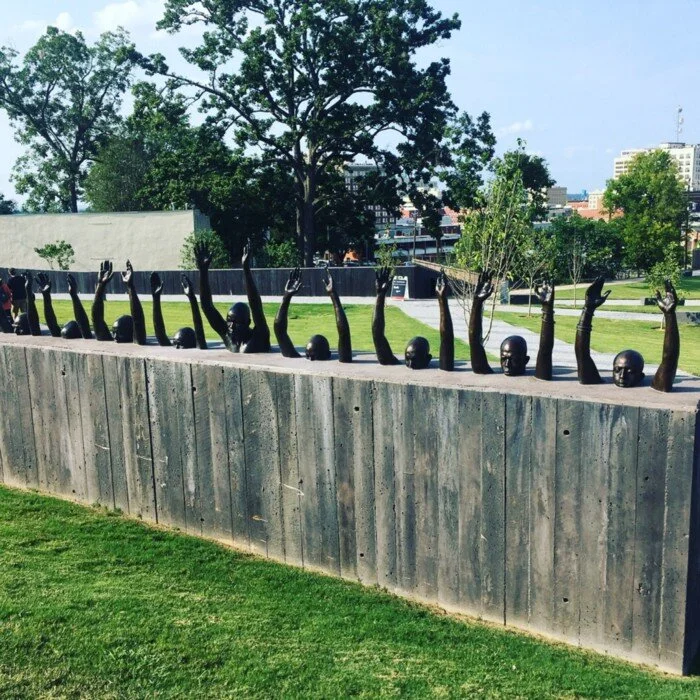Six Actions for Anti-Racist White People
June 4 update: After publishing this a few days ago - an updated version of a piece I wrote last year - I realized I did not adequately set the context of the unprecedented moment we’re in of reckoning with anti-Black racism and racial terror in this country. In the spirit of learning in public, I share the revised piece, along with my commitment to do better — to slow down, to express imperfectly, and to be with myself before leaping to action.
For white people who are grieving and struggling with what to do in this moment and beyond, this is for you.
“Rise Up” sculpture by Hank Willis Thomas at the National Memorial for Peace & Justice
With the horrific murder of George Floyd, we have witnessed law enforcement publicly execute another Black man, and with unquestionable video evidence, still escape accountability. And we know this is not the first Black life taken by police. We know the names of Breonna Taylor, Philando Castile, Eric Garner and so many more, for the same horrific reason. Last year, police killed* over 1,000 people in the U.S., 24% of whom were Black, despite being only 13% of the population. In LA County, the police kill someone every 6–7 days, with only one officer charged since the year 2000.
Now as the Movement for Black Lives leads protests for justice with hundreds of thousands of people showing up across the globe, law enforcement has erupted in reactive violence.
This is not a moment for white people to sit on the sidelines.
There is so much we can do — not just today, but in the coming weeks, months, and years — to be co-conspirators. It’s time for us to use our power — our resources, our relationships, our voice, our bodies, our platforms — in unwavering service of Black liberation and our collective liberation.
What follows are six concepts I return to again and again to ground myself in what we can do as an agents of change in this work for the long haul.
1. Feel your feelings. One of the most destructive tools of white supremacy is our ability to cut ourselves off from our bodies and emotions to endure the injustices and suffering around us. Allow yourself to grieve. Allow yourself to feel the horror of seeing a Black man publicly executed by a police officer. Allow yourself to feel angry at the racism that is baked into our country and has been manifesting itself in genocide, violence and terrorism for centuries. I find when I don’t allow myself to feel, my grief can express in other ways — snapping at a loved one, sinking into myself, or busying myself at work — none of which advances the work that needs to be done. Feeling your feelings is a radical act of justice, as once you feel, you’re so much more able to act.
2. Listen. Don’t ask your Black friends or colleagues to explain the moment to you or hold space for your grief, but listen when they offer insight and reflections. Black people share their stories and perspectives in blogs, articles, books, on social media and maybe even directly with you. Tamika Butler shares powerful reflections and questions in her recent blog. Listen. Reflect. Do your homework.
And in the every day work, it’s critical for us to listen when our friends of color let us know the ways we’re not showing up for them. It’s hard to hear that we’ve hurt someone, but far worse to continue doing the harm. Rachel Elizabeth Cargle lays out the most common pitfalls for those who strive to be anti-racist: “It is never the offender who gets to decide when they’ve offended someone.” Remind yourself that your impact matters more than your intent.
3. Learn & speak our history. Become a student of our history and our current realities. Our country was built on genocide, kidnapping, and enslavement. The more I learn about our history, the more I realize what we’re experiencing right now is not new, but rather the latest incarnation of systemic racism. There are so many places to learn, including the National Memorial for Peace & Justice in Montgomery, AL where you can witness our country’s history of public massacre and racial terror of Black people in the U.S. for the last 400 years.
As you learn these truths, speak them. And the next time you hear a friend say, “this isn’t the country I know and love…,” kindly share the insight that this is the country that Black people and people of color have known for centuries. Which brings us to…
4. Call In. You have the opportunity to authentically connect with white people in your life — to grapple with what’s happening, to share what you’re learning, and to call your white friends into community, into seeing history and current realities, and into action. Ngoc Loan Trần talks about calling in as: “a practice of loving each other enough to allow each other to make mistakes, a practice of loving ourselves enough to know that what we’re trying to do here is a radical unlearning of everything we have been configured to believe is normal.”
We don’t have the luxury of pushing away our white friends and leaving the hard conversations about racism to the Black people in their lives. It’s on us to call them in to a better version of themselves, no matter how much love, patience, and time that takes.
5. Shape your contexts. White supremacy is an ever-present, pernicious force in the U.S. that is as pervasive as the air we breathe. When we talk about white supremacy in this way, we’re not just talking about extreme acts of racial hatred, though that’s certainly one piece of it. We’re talking about the prevailing belief that white people are superior, and that all of our ways — of working, of seeing, of talking, of beauty, of being — are the standard and what’s right. Pause and think about how you define any of the above, and chances are, you’ve thought of those frameworks as neutral, as merely defined by your own individuality.
Tema Okun wrote a powerful piece that talks about the harm of white supremacy culture and the ways we can employ its antidotes. You have the power to shift the norms, behaviors, policies, budgets, and practices in the spaces where you invest your time and energy — your work, your places of worship, your schools, your family. Where are you spending your money? Who is making decisions? What policies govern the space? Working to shift these contexts to more liberatory norms will have profound ripple effects.
6. Dismantle systems. Racism and white supremacy are baked into our systems — law enforcement, criminal justice, health care, education and so much more. Sometimes we refer to these systems as “broken,” but these systems are getting the exact results they are designed to produce. It’s no coincidence and not a design flaw. As the equityXdesign framework lays out: “Racism and inequity are products of design. They can be redesigned.”
We can dismantle these systems and build systems that truly serve our communities in their place. But hold on, there’s no need to take the lead! There are community organizations that have been leading this work for decades. Find the campaigns in your community led by Black people, people of color, and people with lived expertise on these issues. Then follow their lead. Listen for what they’re calling on community to do. Call your electeds and advocate for their policy priorities. Use your power. Advocate to defund the police. Lift up the truth. Donate. Show up to protests. Bring a friend.
You are far more powerful than you realize. Reflect on the influence you have — on your family and friends, your workplace, in your community and schools. Think about how you can wield that power for good.
This is not intended to be a comprehensive or chronological list, but rather a few thoughts on what a grieving white person can do in the face of despair for the loss of life and the mourning as we face what our country really is. We have the power to help make it what it can be.

